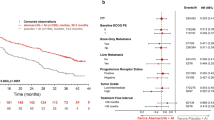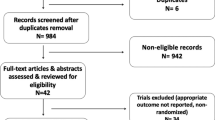Abstract
Third-generation aromatase inhibitors (AIs), including letrozole, are now standard therapy for initial adjuvant endocrine treatment of postmenopausal women with early breast cancer. The International Breast Cancer Study Group’s Breast International Group (BIG) 1–98 trial is examining efficacy and safety of letrozole or tamoxifen, whether used upfront or sequentially, for postmenopausal with hormone receptor-positive breast cancer. Women in the BIG 1–98 trial were randomized to either 5 years’ monotherapy with tamoxifen or letrozole (trial arms A and B, respectively), or to 5 years’ sequential therapy with 2 years of tamoxifen followed by 3 years of letrozole, or 2 years of letrozole followed by 3 years of tamoxifen (arms C and D, respectively). Results of the primary core analysis (PCA) of BIG 1–98, at a median follow-up of 25.8 months, showed a significant improvement in disease-free survival for patients treated with initial adjuvant letrozole relative to those on tamoxifen (P=0.003). Of interest, there was an important reduction in distant metastases, the most common and ultimately fatal type of early recurrence, for patients allocated to initial letrozole compared with initial tamoxifen. Since the PCA, there have been further analyses of BIG 1–98 with variations in the cohorts analyzed and follow-up period. The first and largest central pathology review in an adjuvant AI trial to date was also performed in the BIG 1–98 trial. In light of the impending sequence analysis, expected in late 2008, the goal of this article is to describe and summarize the breadth of information learned to date and highlight the key findings regarding the efficacy and safety of letrozole in the initial adjuvant setting.
Similar content being viewed by others
References
Early Breast Cancer Trialists’ Collaborative Group (EBCTCG). Effects of chemotherapy and hormonal therapy for early breast cancer on recurrence and 15-year survival: an overview of the randomised trials. Lancet. 2005;365:1687–1717.
Choueiri TK, Alemany CA, Abou-Jawde RM, Budd GT. Role of aromatase inhibitors in the treatment of breast cancer. Clin Ther. 2004;26:1199–1214.
Dixon JM, Renshaw L, Young O, et al. Letrozole suppresses plasma estradiol and estrone sulphate more completely than anastrozole in postmenopausal women with breast cancer. J Clin Oncol. 2008;26:1671–1676.
Geisler J, Helle H, Ekse D, et al. Letrozole is superior to anastrozole suppressing breast cancer tissue and plasma estrogen levels. Clin Cancer Res. 2008;14:6330–6335.
Baum M, Budzar AU, Cuzick J, et al. ATAC Trialists’ Group. Anastrozole alone or in combination with tamoxifen versus tamoxifen alone for adjuvant treatment of postmenopausal women with early breast cancer: first results of the ATAC randomised trial. Lancet. 2002;359:2131–2139. Erratum in: Lancet. 2002;360:1520.
Thürlimann B, Keshaviah A, Coates AS, et al. A comparison of letrozole and tamoxifen in postmenopausal women with early breast cancer. N Engl J Med. 2005;353:2747–2757.
Braithwaite RS, Chlebowski RT, Lau J, George S, Hess R, Col NF. Meta-analysis of vascular and neoplastic events associated with TAM. J Gen Intern Med. 2003; 18:937–947.
Mauriac L, Keshaviah A, Debled M, et al. Predictors of early relapse in postmenopausal women with hormone receptor-positive breast cancer in the BIG 1–98 trial. Ann Oncol. 2007;18:859–867.
Coates AS, Keshaviah A, Thurlimann B, et al. Five years of letrozole compared with tamoxifen as initial adjuvant therapy for postmenopausal women with endocrine-responsive early breast cancer: update of study BIG 1–98. J Clin Oncol. 2007;25: 486–492.
Perez E. The balance between risks and benefits: long-term use of AIs. Eur J Cancer Suppl. 2006;4:16–25.
McDonald CC, Alexander FE, Whyte BW, Forrest AP, Stewart HJ. Cardiac and vascular morbidity in women receiving adjuvant tamoxifen for breast cancer in a randomised trial. The Scottish Cancer Trials Breast Group. BMJ. 1995;311:977–980.
Rutqvist LE, Mattsson A. Cardiac and thromboembolic morbidity among postmenopausal women with early-stage breast cancer in a randomized trial of adjuvant tamoxifen. The Stockholm Breast Cancer Study Group. J Natl Cancer Inst. 1993;85:1398–1406.
Goss PE, Ingle JN, Martino S, Robert NJ, Muss HB, Piccart MJ. Randomized trial of letrozole following tamoxifen as extended adjuvant therapy in receptor-positive breast cancer: updated findings from NCIC CTG MA.17. J Natl Cancer Inst. 2005;97: 1262–1271.
Herrington DM, Klein KP. Effects of SERMs on important indicators of cardiovascular health: lipoproteins, hemostatic factors, and endothelial function. Womens Health Issues. 2001;11:95–102.
Mouridsen H, Keshaviah A, Coates AS, et al. Cardiovascular adverse events during adjuvant endocrine therapy for early breast cancer using letrozole or tamoxifen: safety analysis of BIG 1–98 trial. J Clin Oncol. 2007;25:5715–5722.
Winer EP, Hudis C, Burstein HJ, et al. American Society of Clinical Oncology technology assessment on the use of aromatase inhibitors as adjuvant therapy for postmenopausal women with hormone receptor-positive breast cancer: status report 2004. J Clin Oncol. 2005;23:619–629.
Crivellari D, Sun Z, Coates AS, et al. Aromatase inhibitors (AI) for elderly patients: efficacy, compliance and safety according to patient age in the BIG 1–98 trial. J Clin Oncol. 2007;25(18S): 9033. Abstract.
Viale G, Regan MM, Maiorano E, et al. Prognostic and predictive value of centrally reviewed expression of estrogen and progesterone receptors in a randomized trial comparing letrozole and tamoxifen adjuvant therapy for postmenopausal early breast cancer: BIG 1–98. J Clin Oncol. 2007;25:3846–3852.
Rasmussen BB, Regan MM, Lykkesfeldt AE, et al. BIG 1–98 Collaborative and International Breast Cancer Study Groups. Adjuvant letrozole versus tamoxifen according to centrally-assessed ERBB2 status for postmenopausal women with endocrine-responsive early breast cancer: supplementary results from the BIG 1–98 randomised trial. Lancet Oncol. 2008;9:23–28.
Viale G, Giobbie-Hurder A. Value of centrally-assessed Ki-67 labeling index as a marker of prognosis and predictor of response to adjuvant endocrine therapy in the BIG 1–98 trial of postmenopausal women with estrogen receptor-positive breast cancer. Breast Cancer Res Treat. 2007;106(suppl. 1): S17. Abstract 64.
Viale G, Regan M, Dell’Orto P, et al. Central review of ER, PgR and HER-2 in BIG 1–98 evaluating letrozole versus tamoxifen as adjuvant endocrine therapy for postmenopausal women with receptorpositive breast cancer. Breast Cancer Res Treat. 2005:94(suppl. 1):S13. Abstract 44.
Vakaet LA, Buyse M. Comparative results of two adjuvant trials comparing 5 years of an aromatase inhibitor (AI) with 5 years of tamoxifen (TAM) in postmenopausal women with early breast cancer (EBC). Breast Cancer Res Treat. 2006;100(suppl. 1):S108–S109. Abstract 2084.
Coates AS, Mouridsen H, Sun Z, et al. Cardiovascular adverse events during adjuvant endocrine therapy for early breast cancer using letrozole or tamoxifen: updated safety analysis of trial BIG 1–98. J Clin Oncol. 2007;25(18S):8s. Abstract 521.
Rasmussen BB, Regan MM, Lykkesfeldt AE, et al. Central assessment of ER, PgR and HER2 in BIG 1–98 evaluating letrozole (L) compared to tamoxifen (T) as initial adjuvant endocrine therapy for postmenopausal women with hormone receptor-positive breast cancer. J Clin Oncol. 2007;25(18S):12s. Abstract 528.
Giobbie-Hurder AE, Gelber RD. Design and evolution of BIG 1–98: a randomized, double-blind, phase-III study comparing letrozole and tamoxifen as adjuvant endocrine therapy for postmenopausal women with receptor-positive, early breast cancer - BIG 1–98 Collaborative and International Breast Cancer Study Groups Ann Oncol. 2008;19(suppl. 8). Abstract 192P.
Doughty JC, Wilson CR, Monypenny IJ, et al. Distant metastasis: the most common type of early recurrence with adjuvant tamoxifen therapy. Breast Cancer Res Treat. 2007;106(suppl. 1):S145. Abstract 3057.
Author information
Authors and Affiliations
Corresponding author
Rights and permissions
About this article
Cite this article
Wardley, A.M. Understanding the BIG results: Insights from the BIG 1–98 trial analyses. Adv Therapy 25, 1257–1275 (2008). https://doi.org/10.1007/s12325-008-0128-5
Published:
Issue Date:
DOI: https://doi.org/10.1007/s12325-008-0128-5




